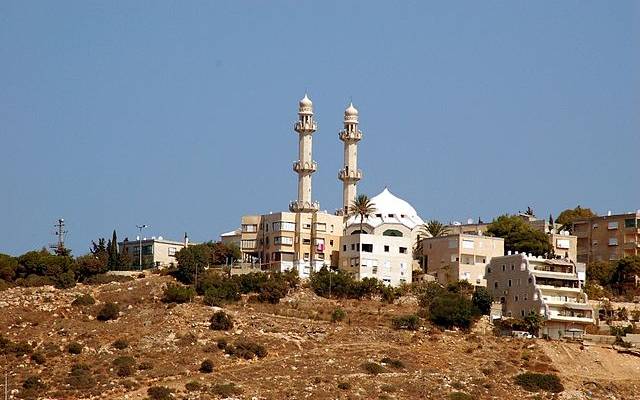
The Mahmood Mosque near Haifa, Israel, is the only Ahmadiyya mosque in the Middle East. (Wikicommons)
Ahmadi Muslims, Persecuted in Mideast, Find Freedom in Israel
Thanks to United with Israel
A small Islamic sect, the Ahmadiyya community is a persecuted minority across the Middle East. In Israel, Ahmadis enjoy full religious and cultural freedom and pray in the only Ahmadi mosque in the region.
By: Eliana Rudee/JNS.org
As a small Islamic sect of an estimated 20 million people—about 1 percent of the global Muslim population—the Ahmadiyya community is a persecuted minority across the Middle East. But at the southern entrance of the northern Israeli city of Haifa lies Kababir village, home to 2,000 residents, 70 percent of whom are Ahmadi Muslims.
In Kababir, Ahmadis enjoy full religious and cultural freedom and pray in the only Ahmadi mosque in the Middle East, opened in 1934 and redone in 1979. The safe haven they have found in the Jewish State, as compared to the broader Middle East, mirrors that of the Druze, Bahá’í and Christians.
According to Israeli Ahmadiyya community leader Muhammad Sharif Odeh, the Ahmadis have complete religious freedom in Israel, especially compared to their brethren in the rest of the region and in Pakistan, where Ahmadis cannot use any religious symbols or even greet each other with a traditional Arabic salutation.
“Ahmadis in Arab countries in the Middle East suffer a lot,” Odeh said. “They are not allowed to have mosques or minarets, and they go to jail for their beliefs and are persecuted.”
Despite their safety and freedom in Israel, “there is a long way ahead” for Israeli Ahmadis in the realm of civil and political rights, said Odeh, who spoke of being discriminated against by Israelis for being Arab and by other Muslims for being Ahmadi.
Century-Old Beliefs
The Ahmadiyya movement was established in 1889 by Punjabi Hazrat Mirza Ghulam Ahmad. He claimed to have received revelations from Allah, who imposed the duty upon him to rejuvenate Islam through universal reformation and peaceful means. Ahmadi Muslims assert that they are true Muslims, but believe that the founder of their community is Mahdi, the shadow prophet of Islam and their messiah. They also believe that while the Quran is their final book of law, its inspiration and revelation continues with their caliphs.
The Ahmadiyya Muslim community arrived in Israel in 1927, when the first Muslim missionary, Maulana Jalalud-Din Shams, was sent from India to the Near East and Middle East to convey the message of Mahdi. By the early 1930s, Israel’s Kababir village had become the center of the Ahmadiyya Muslim community in the entire Middle East.
Ahmadiyya doctrine centers on the belief that the Prophet Muhammad forbade wars and the use of weapons, and that it is the duty of Ahmadis to achieve universal peace based on justice and to establish the sovereignty of Islam in the entire world through education. “Mirza Ghulam Ahmad came to fix interpretations of the Quran, that the holy book is a source of care for everybody and of love, rather than killing, hatred and violence,” said Odeh.
He continued, “The idea that you can use the sword to promote jihad is not true Islam. Jihad does not refer to promoting war, but fighting the evil inside us and spreading the word of the Quran to the world with kindness and care.”
Love, Humanity, Universal Peace
The Ahmadiyya philosophy, explained Odeh, is “to teach, repair and educate people for love, humanity, universal peace, harmony and cooperation.”
As such, Ahmadis believe that it is important to take care of other faiths’ holy places before their own mosques, and there is a special Ahmadiyya committee in Israel that helps locals in need regardless of their religious backgrounds.
Additionally, Kababir is home to an elementary school that educates Jews and Christians alike. “Ninety-percent of the school is Ahmadi, and the rest are Jewish and Christian,” said Kababir spokesperson Mu’ath Odeh, a cousin of Muhammad Sharif Odeh. “It shows that if you want to create coexistence, it’s possible.”
But Muhammad Sharif Odeh is not optimistic that this universal message of love is being played out in the world, or even in Israel. He is skeptical of the influence of politicians, who “care only about their own self, party and chair,” as well as security forces who, in his view, initiate collective punishment and non-defensive wars.
Ahmadis Renounce Terrorism
“I am a Muslim, Palestinian, and I am here. It is a good thing that there is an Israeli state,” said Odeh, who said he has a good relationship with many members of the Knesset, including Joint Arab List party leader Ayman Odeh, who lives in Kababir, and Likud lawmaker Yehuda Glick, whom Muhammad Sharif Odeh said has prayed at his mosque twice.
The Ahmadis renounce terrorist attacks as well as the capturing or killing of Israeli soldiers, not only because bloodshed is against their religious teachings, but also because they believe that only governments have the authority to start wars. Odeh said, “We are creating fanaticism in the West Bank and Gaza. It has become a greenhouse for terrorism and radicalism. Palestinians play with plastic and wood guns while Israelis play with dolls. Barbarism isn’t the solution, we must respect peace agreements. You can’t send people to kill others and say you want peace.”
Ayman, a 32-year-old Ahmadi convert from Nablus (Shechem) who asked to be identified only by his first name, condemned the Feb. 5 terrorist attack in which an Israeli Arab fatally stabbed Rabbi Itamar Ben Gal, a 29-year-old Israeli father of four, on his way to his nephew’s brit milah.
“I cry when I see innocent people die,” said Ayman, whose family disowned him when he converted to the Ahmadiyya sect. “They do this in the name of my god, my prophet and my book. I need to do hard work to fix what [the terrorist who killed Ben Gal] did.”







